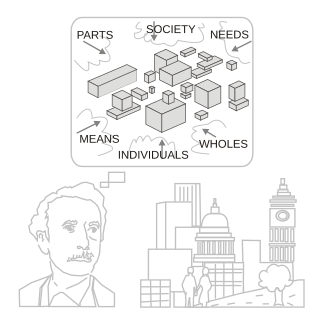Related Research Articles

William Ross Ashby was an English psychiatrist and a pioneer in cybernetics, the study of the science of communications and automatic control systems in both machines and living things. His first name was not used: he was known as Ross Ashby.

Systems Science, also referred to as systems research, or, simply, systems, is a transdisciplinary field that is concerned with understanding simple and complex systems in nature and society, which leads to the advancements of formal, natural, social, and applied attributions throughout engineering, technology and science, itself.

Sociocybernetics is an interdisciplinary science between sociology and general systems theory and cybernetics. The International Sociological Association has a specialist research committee in the area – RC51 – which publishes the (electronic) Journal of Sociocybernetics.

In sociology, social complexity is a conceptual framework used in the analysis of society. In the sciences, contemporary definitions of complexity are found in systems theory, wherein the phenomenon being studied has many parts and many possible arrangements of the parts; simultaneously, what is complex and what is simple are relative and change in time.
Second-order cybernetics, also known as the cybernetics of cybernetics, is the recursive application of cybernetics to itself and the reflexive practice of cybernetics according to such a critique. It is cybernetics where "the role of the observer is appreciated and acknowledged rather than disguised, as had become traditional in western science". Second-order cybernetics was developed between the late 1960s and mid 1970s by Heinz von Foerster and others, with key inspiration coming from Margaret Mead. Foerster referred to it as "the control of control and the communication of communication" and differentiated first order cybernetics as "the cybernetics of observed systems" and second-order cybernetics as "the cybernetics of observing systems".
Ranulph Glanville was an Anglo-Irish cybernetician and design theorist. He was a founding vice-president of the International Academy for Systems and Cybernetic Sciences (2006–2009) and president of the American Society for Cybernetics (2009–2014).
Walter Frederick Buckley was an American sociologist, and professor of sociology at the University of New Hampshire. Buckley was among the first to apply concepts from general systems theory based on the work of Bertalanffy to sociology

Management cybernetics is concerned with the application of cybernetics to management and organizations. "Management cybernetics" was first introduced by Stafford Beer in the late 1950s and introduces the various mechanisms of self-regulation applied by and to organizational settings, as seen through a cybernetics perspective. Beer developed the theory through a combination of practical applications and a series of influential books. The practical applications involved steel production, publishing and operations research in a large variety of different industries. Some consider that the full flowering of management cybernetics is represented in Beer's books. However, learning continues.
Gerard de Zeeuw is a Dutch scientist and Emeritus professor Mathematical modelling of complex social systems at the University of Amsterdam in the Netherlands. He is known for his work on the theory and practice of action research, particularly on the "Problems of increasing competence", "Second order organisational research" and "Three phases of science: A methodological exploration".
Michael Christopher Jackson OBE is a British systems scientist, consultant and Emeritus Professor of Management Systems and former Dean of Hull University Business School, known for his work in the field of systems thinking and management.
The Dutch Systems Group, or Netherlands Society for Systems Research or Systeemgroep Nederland, is a society in the Netherlands for systems theory, and its applications. Systems theoretical problems the society focuses on are, for example evolution, innovation, selection, variation, translation, participation and methodological innovation.

Cybernetics is a field of systems theory that studies circular causal systems whose outputs are also inputs, such as feedback systems. It is concerned with the general principles of circular causal processes, including in ecological, technological, biological, cognitive and social systems and also in the context of practical activities such as designing, learning, and managing.
Yi Lin, also known as Jeffrey Forrest and Jeffrey Yi-Lin Forrest, is a professor of mathematics, systems science, economics, and finance at Pennsylvania State System of Higher Education (SSHE) and at several major universities in China. Lin has been an active researcher in the field of systems science since mid-1980s and serves as the founder and president of the International Institute for General Systems Studies (IIGSS).
Thomas Martin Baumgartner is a Swiss economist, known for his pioneering work in social systems theory with Walter F. Buckley, Tom R. Burns and others.
Johannes "Hans" van der Zouwen is a Dutch sociologist, and Emeritus Professor of Social Research Methodology at the Vrije Universiteit in Amsterdam, known for his pioneering work with Felix Geyer in the field of sociocybernetics.

Gideon Jan (Don) Mellenbergh was a Dutch psychologist, who was Professor of Psychological methods at the University of Amsterdam, known for his contribution in the field of psychometrics, and Social Research Methodology.
Markus Schwaninger is an Austrian economist and Professor of Management at the University of St. Gallen, Switzerland, and Director of the International World Organization of Systems and Cybernetics. He is known for his co-authorship of the St. Galler Management-Model.
Albert Frederik Gerhard Hanken was a Dutch mathematician, inventor, and Emeritus Professor of systems theory at the University of Twente, known for his contributions to the field of systems theory and social analysis.
Cornelis Johannes "Cor" van Dijkum is a Dutch sociologist, consultant and academic at the Utrecht University, known for his contributions in the field of methodology for complex societal problems.
References
- ↑ Bernd R. Hornung , IN MEMORIAM: Felix Geyer, 1933-2020, in: RC51 Newsletter, Issue 40, October 2020.
- ↑ Heylighen, Francis, and Cliff Joslyn. "Cybernetics and second order cybernetics." Encyclopedia of physical science & technology 4 (2001): 155-170.
- ↑ Ramalingam, Ben, et al. Exploring the science of complexity: Ideas and implications for development and humanitarian efforts. Vol. 285. London: Overseas Development Institute, 2008.
- ↑ Gerard de Zeeuw (2006), "A forgotten message? von Bertalanffy's puzzle" in: Kybernetes, Vol 35 Issue 3/4, pp. 433–440 DOI: 10.1108/03684920610653728